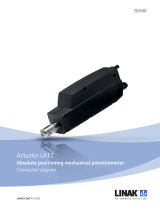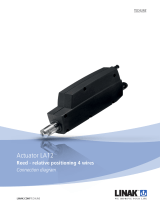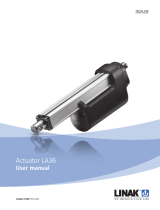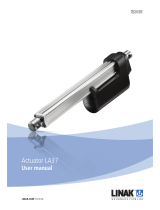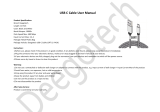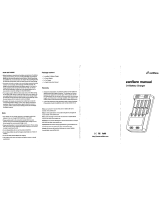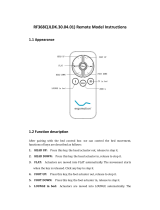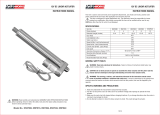
Page 12 of 192
DECLARATION OF INCORPORATION OF PARTLY
COMPLETED MACHINERY
LINAK A/S
Smedevænget 8
DK - 6430 Nordborg
Herewith declares that LINAK DESKLINE
®
products as characterised by the following models and types:
Control Boxes CBD6S
Linear Actuators DB5, DB6, DB14, LA23, LA31
Lifting Columns DL1A, DL2, DL4S, DL5, DL5IC, DL6, DL6IC, DL7, DL8, DL8IC, DL9, DL9IC, DL10, DL10IC, DL11, DL11IC, DL12, DL14,
DL15, DL16, DL16IC, DL17, DL19, DL19IC, BASE1
Desk Panels DPA, DPB, DPH, DPF, DPG, DPT, DP, DP1CS
RF Controls HB10RF, HB20RF, RFRL
Accessories BA001, BLE2LIN, DS1, DF2, Kick & Click, SLS, SMPS001, SMPS002, SMPS006
Herewith declares that
LINAK HOMELINE
®
products as characterised by the following models and types:
Control Boxes CB9H, CBH Advanced, CBH Basic
Linear Actuators LA10, LA18, LA27, LA29, LA31 HOMELINE, LA40 HOMELINE
Dual Actuators TD3, TD4, TD5
Controls HB10, HB10 Wireless, HB40, HB60, HC05 Wireless, HC10 Wireless, HC20 Wireless, HC30 Wireless
Accessories BLE2LIN, DC CONNECTOR, LED Lightbox, LED Light Rail, Lightplug001, Massage Motor, SMPS001, SMPS002, SMPS006
Herewith declares that
LINAK MEDLINE
®
& CARELINE
®
products as characterised by the following models and types:
Control Boxes CA30, CA40, CB6, CB6S, CB6OBMe, CB6P2, CB8, CB9, CB12, CB14, CB16, CB20, CBJ, CBJ Care, CBJ Home, CO41, CO61, CO65, CO71, PJ2
Linear Actuators LA12, LA20, LA22, LA23, LA27, LA28, LA29, LA30, LA31 MEDLINE CARELINE, LA32, LA34, LA40 MEDLINE CARELINE, LA43, LA43IC, LA44, LA44IC
Lifting Columns BL1, LP2, LP3, LC2, LC3
Controls ACC, ACK, ACO, ACOM, ACL, ACM, ACP, ACT, DP, DPH, FS, FS3, FPP, HB20, HB30, HB40, HB50, HB70, HB80, HB100, HD80, HL70, HL80, IRO
Accessories BA18, BA19, BA21, BAJ, BAJL, CCM, CH01, CHJ2, COBO, DJB, EBC, IRO, MJB, MJB8, SMPS19, SMPS30, SCO, SLS, Massage Motor, QLCI, QLCI2, UBL2, WET
Herewith declares that
LINAK TECHLINE
®
products as characterised by the following models and types:
Linear Actuators LA12, LA14, LA22, LA23, LA25, LA30, LA33, LA35, LA36, LA37
Power Supply SMPS-T160
Accessories CS16, FMB, LSD
Nordborg, 2019-05-27
LINAK A/S
John Kling, B.Sc.E.E.
Certification and Regulatory Affairs
Authorized to compile the relevant technical documentation
comply with the following parts of the Machinery Directive 2006/42/EC, ANNEX I, Essential health and safety requirements relating to the design and construction of machinery:
1.5.1 Electricity supply
The relevant technical documentation is compiled in accordance with part B of Annex VII and that this documentation or part hereof will be transmitted by post or electronically
to a reasoned request by the national authorities.
This partly completed machinery must not be put into service until the final machinery into which it is to be incorporated has been declared in
conformity with the provisions of the Machinery Directive 2006/42/EC where appropriate.























